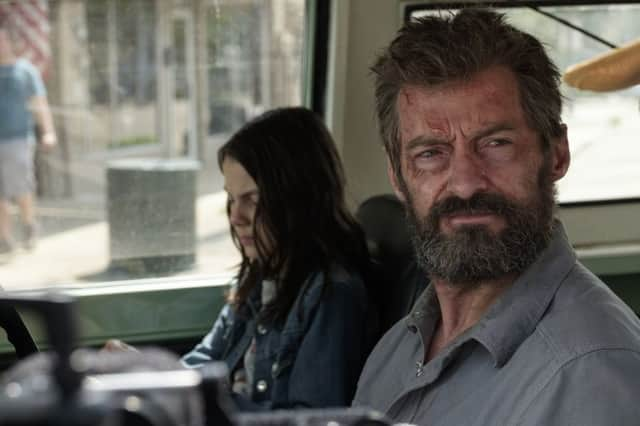Film reviews: Logan | Certain Women | The Viceroy's House | Trespass Against Us | Headshot


Logan (15) ****
Certain Women (12A) ****
The Viceroy’s House (12A) ***
Trespass Against Us (15) **
Headshot (18) **
Third time’s a charm for the X-Men’s most venerable and violent character: the new Wolverine movie Logan sees Hugh Jackman gives his career-making role the send-off it deserves. Where the previous two spin-off films – he’s played the character nine times in total – were either pointlessly expansive
(X-Men Origins: Wolverine) or boringly meditative (The Wolverine), this is a fiercer and more focused outing.
Advertisement
Hide AdHaving apparently taken a pay cut in exchange for the freedom to make it a little more adult, Jackman and director James Mangold (who also made The Wolverine) have delivered a movie that makes good on the mutton-chopped mauler’s mythic status as a samurai-like lone wolf whose indestructibility can’t prevent those close to him from dying. That’s a very Clint Eastwood/Toshiro Mifune-style archetype and Jackman and Mangold (who also makes explicit reference to classic western Shane in the movie) exploit the film’s 15 certificate to dramatise the toll the character’s itinerant lifestyle has taken on him over the years.
Set in a near future in which mutants have been all but wiped out, the film kicks off with him looking older, more ravaged, more beaten down. His body doesn’t heal like it used to and his existential angst is now tinged with suicidal despair. Trying to keep his head down, he’s working as a limo driver, trying to save enough money to buy a boat that he can use as a sanctuary for himself and a sickly Charles Xavier (Patrick Stewart), whom he’s been hiding in an abandoned power station across the border in Mexico – far away from the public whose general safety his ailing mind threatens.
Although the chronology of the X-Men cinematic universe is so screwed up at this point that it would require a flow-chart and an intimate knowledge of the entire history of the comics to figure out how exactly this is all supposed to fit in with the other films, Mangold quickly streamlines the plot to focus on a mysterious young mutant girl called Laura with powers very similar to Logan himself. Played with real authority by newcomer Dafne Keen, she’s a ball of berserker rage whose origins reinforce the damage non-mutants have done in their ongoing efforts to control or destroy that which they don’t understand. Like the first couple of X-Men films, Logan’s plot functions as a pliable metaphor for the treatment of minorities in America and Mangold can’t resist using the border-hopping set-up and the subsequent road trip that Logan, Charles and Laura undertake to further critique the country.
Where the film really comes into its own, though, is in Logan’s personal journey and the grittiness with which it is told. The fight scenes are entertainingly brutal, but the consequences are bloody and the emotional stakes high. It’s an elegiac superhero movie that understands there’s no living with killing.
Kelly Reichardt is a master of crafting delicately wrought dramas full of marginal characters whose initial inscrutability masks rich interior lives. In movies such as Old Joy and Wendy and Lucy (or genre experiments such as Meek’s Cutoff and Night Moves), those interior lives are revealed through careful observation of body language and by paying close attention to what’s said and what isn’t.
The latter is especially true of Certain Women, a triptych of loosely related stories in which the female protagonists constantly come into contact with people unwilling to listen to what they have to say. Whether it’s an attorney (Laura Dern) whose client refuses to accept her advice, a young mother (Michelle Williams) whose unfaithful husband constantly undermines her, or a part-time adult-education teacher (Kristen Stewart) unable to verbally acknowledge the shine a lonely female ranch-hand (Lily Gladstone) has randomly taken to her, Reichardt transforms these subtle, subtext-laden tales into achingly humanistic cinema, making for a film that’s moving, funny and absurd in all the ways that life is.
Advertisement
Hide AdViceroy’s House sees Bend it Like Beckham director Gurinder Chadha deliver her own version of a historical epic by telling the story of India’s partition in 1947 through the prism of a Downton Abbey/Upstairs, Downstairs-style melodrama. Set within the titular Delhi mansion of Lord Mountbatten (Hugh Bonneville), Britain’s last viceroy to India and the man whose compromised plan to end British rule there resulted in a large scale humanitarian disaster, the film looks at this moment from the perspective of the British rulers contemplating the end of Empire and the Indian staff trying to figure out how the imminent changes will enhance or damage their futures. Laying out in fairly blunt fashion the issues at stake, Chadha weaves together various emotive subplots with varying degrees of success, resulting in a film that’s watchable enough but one that also sometimes feels a little lightweight.
Gloucestershire-set crime drama Trespass Against Us finds Michael Fassbender trying out a West Country accent that’s about as convincing as the film’s efforts to blend genre thrills with earnest family drama. He plays the second-in-command of a crew of travellers whose life of caravans and criminality he’s making tentative steps to escape for the sake of his kids. Alas, the film overestimates the appeal of Fassbender’s character as he sticks two fingers up to his gangster father (Brendan Gleeson), the police and the middle-class locals the film groaningly demonises.
Advertisement
Hide AdHeadshot is a great title for a wall-to-wall action film in which characters are repeatedly bludgeoned, shot and stabbed in the cranium. Unfortunately, the relentless carnage on offer in this vehicle for The Raid’s Iku Uwais feels more punishing for the viewer. ■